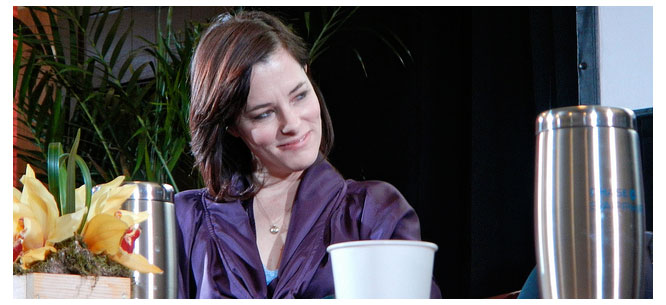Parker Posey: Film Economics and Funny Girls
Parker Posey: Film Economics and Funny Girls

When the audio book of Betty Friedan’s Feminine Mystique was to be recorded back in 2009, producers approached Parker Posey to voice the canonical feminist text. Most known for her portrayal of lovable slacker ditzes such as the soft-serve-wielding Libby Mae in Waiting for Guffman; Darla, the sadistic freshman hazer in Dazed and Confused; and of course Mary, the Gaultier-obsessed ersatz club promoter in Party Girl, Posey might, at first glance, seem an odd choice. How would the so-called “queen of the indies,” synonymous with nineties froth, imbue the requisite gravitas into women’s mid-century domestic oppression of matching slipcover fabric and chauffeuring the children to Cub Scouts and Brownies?
Over the course of Posey’s twenty-plus-year career, the actor has subtly critiqued recognizable archetypes—the ditz, the manic pixie dream girl—through her quirky characterizations and awkward timing. Posey’s low, taffy-pulled voice and Valley Girl cadences were, in fact, the perfect match for Friedan’s book, especially because fifty years later “the problem that has no name” feels almost quaint and kitschily retro, in light of all the current leaning in and ending of men. Posey lends dignity and wit to the book, but she also adds a layer of understated irony, stretching out Friedan’s syllables: “Is this allll?”
In Posey’s latest film, Price Check, she takes on a modern iteration of workplace feminism. Written and directed by Michael Walker, the film follows Susan, a forty-something corporate go-getter (or “a real ballbuster,” in the estimation of one of her male underlings), who could stand for Lean In author Sheryl Sandberg writ large. Susan leans in—way in. Working in the dreary office parks of Long Island, Susan is sent into the corporate office of a supermarket chain with novel marketing solutions and ambitious goals to raise her team’s productivity. Like Marissa Mayer of Yahoo, she cuts flex time for her employees to galvanize the group and raise sales, and, as in former director of policy planning for the State Department Anne-Marie Slaughter’s 2012 Atlantic Monthly cover story, a part of her craves the briefcase and a baby, too.
Posey describes Susan as “a feminist brat,” but “she’s active, she drives the scenes, she calls the shots.” She’s a fantastic Machiavellian character, and she never relents throughout the movie. Walker explained, “Susan will do whatever she needs to do to get things done. She’s up against this male bureaucracy, and it’s frustrating.” One such moment occurs in a meeting with the usual white male boiled-potato-looking execs. When Susan is accused of irrationally overreaching, Posey throws herself on the boardroom’s neutral carpeting in a full histrionic mode, screaming, “Why did you hire me?” Walker did not write Susan’s meltdown with terrifying estrogen levels in mind...
Subscribe now to read the full article
Online OnlyFor just $19.95 a year, get access to new issues and decades' worth of archives on our site.
|
Print + OnlineFor $35 a year, get new issues delivered to your door and access to our full online archives.
|






